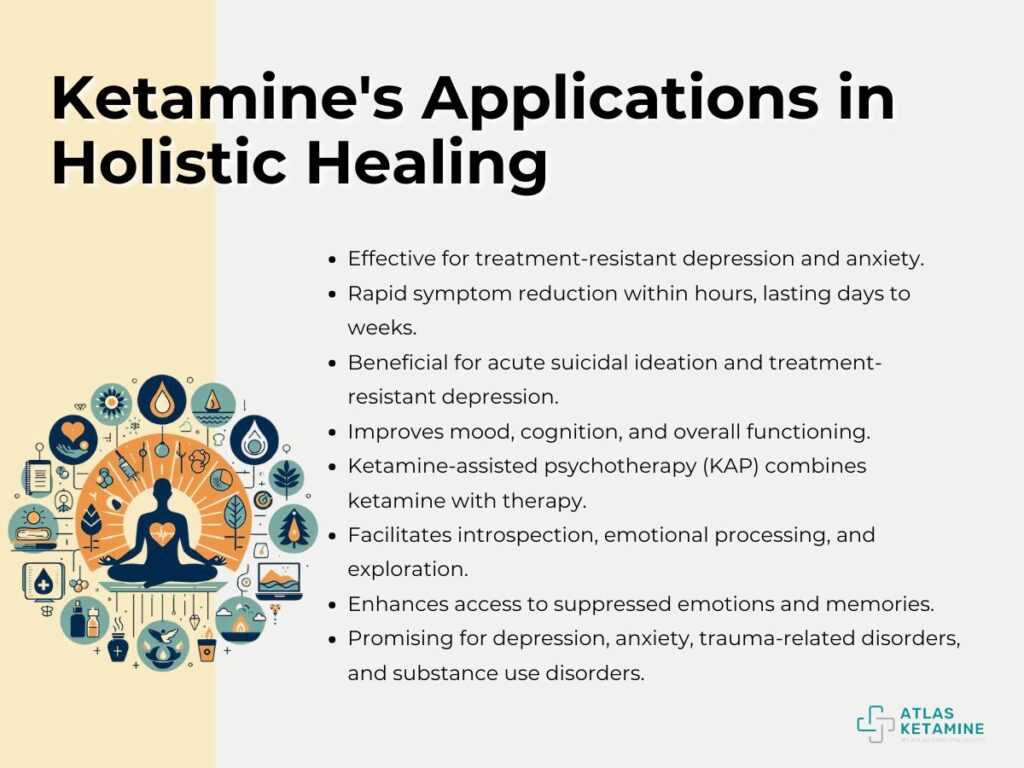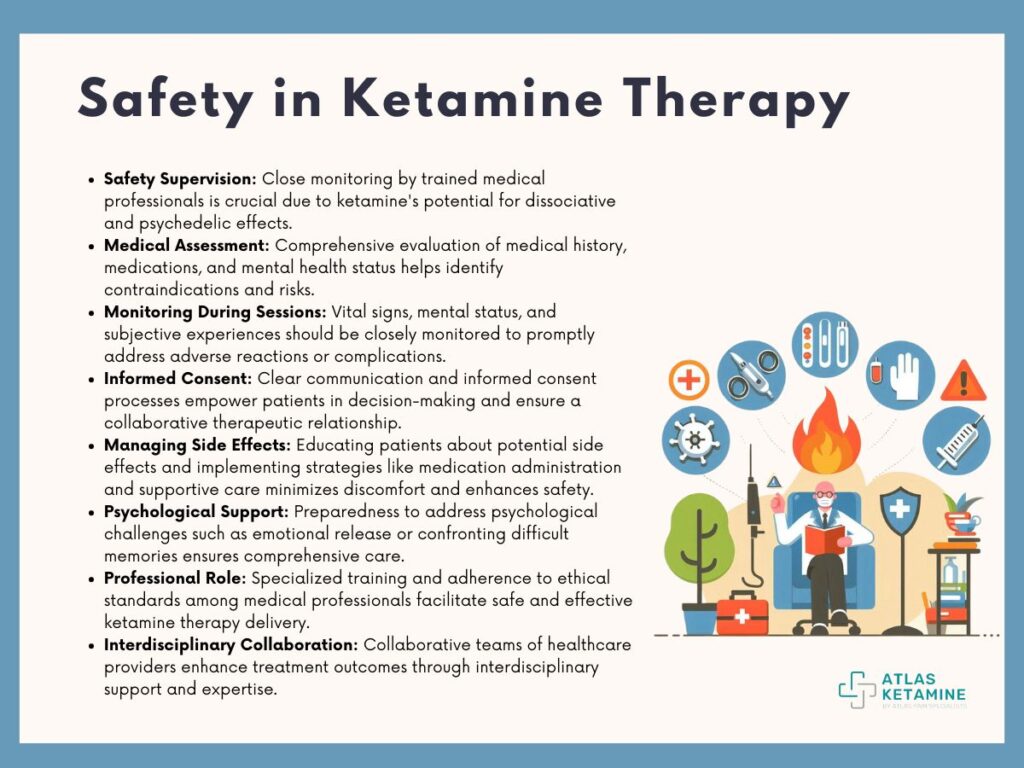Ketamine, once solely recognized for its use as an anesthetic, has now emerged as a powerful tool in holistic healing. Beyond its traditional medical applications, ketamine's unique pharmacological properties have sparked interest in its potential for treating mental health conditions, chronic pain, and fostering spiritual growth.
By modulating glutamatergic signaling and promoting neuroplasticity, ketamine offers a multifaceted approach to healing that addresses the interconnectedness of mind, body, and spirit. This article explores ketamine's role in holistic healing, delving into its mechanisms of action, therapeutic applications, and integration with complementary practices to promote comprehensive well-being.
Understanding Ketamine's Mechanisms
Ketamine, originally developed as an anesthetic, has garnered significant attention for its rapid and robust antidepressant effects. Its mechanism of action, however, extends beyond anesthesia and into the realms of psychiatry and neuroscience.
Ketamine primarily functions as an antagonist of the N-methyl-D-aspartate (NMDA) receptor, a subtype of glutamate receptor in the brain. By blocking these receptors, ketamine inhibits the excitatory neurotransmitter glutamate from binding, thus modulating glutamatergic signaling pathways.
This modulation leads to downstream effects on various neurotransmitter systems, including the release of neurotransmitters like serotonin, dopamine, and brain-derived neurotrophic factor (BDNF), which are implicated in mood regulation and neuroplasticity.
The Role of Glutamate and NMDA Receptors in Ketamine's Mechanisms
Glutamate, the brain's primary excitatory neurotransmitter, plays a pivotal role in synaptic plasticity, learning, and memory. NMDA receptors, a subtype of glutamate receptors, are crucial for synaptic plasticity and long-term potentiation (LTP), the cellular processes underlying learning and memory formation.
Ketamine's blockade of NMDA receptors leads to disinhibition of glutamatergic signaling, resulting in increased synaptic plasticity and the induction of LTP. These effects are thought to contribute to ketamine's rapid antidepressant actions, as enhanced synaptic plasticity facilitates the formation of new neural circuits and promotes adaptive changes in brain function.
The Impact of Ketamine on Neuroplasticity and Neurogenesis
Neuroplasticity, the brain's ability to reorganize and form new neural connections in response to experiences and environmental stimuli, is a fundamental mechanism underlying learning, memory, and mood regulation.
Ketamine has been shown to enhance neuroplasticity by promoting the growth of dendritic spines, increasing synaptic connectivity, and facilitating the formation of new neural circuits. Furthermore, ketamine has been found to stimulate neurogenesis, the generation of new neurons, particularly in brain regions implicated in mood regulation, such as the hippocampus.
These neuroplastic changes are believed to underlie ketamine's enduring antidepressant effects and may provide insights into the development of novel treatments for mood disorders.
Ketamine's Applications in Holistic Healing
Ketamine has emerged as a promising treatment for depression and anxiety, particularly for individuals who have not responded to traditional antidepressant medications. Clinical trials have demonstrated that a single subanesthetic dose of ketamine can produce rapid and significant reductions in depressive symptoms, with effects often observed within hours and lasting for days to weeks.

Ketamine's rapid onset of action is particularly beneficial for individuals experiencing acute suicidal ideation or treatment-resistant depression, providing relief when conventional treatments have failed. Ketamine's antidepressant effects extend beyond symptom reduction to improvements in mood, cognition, and overall functioning, making it a valuable addition to the treatment armamentarium for mood disorders.
Ketamine-assisted psychotherapy (KAP) combines the acute effects of ketamine with psychotherapeutic techniques to enhance the therapeutic experience and promote lasting psychological change. During KAP sessions, individuals receive a subanesthetic dose of ketamine under the guidance of a trained therapist, who facilitates introspection, emotional processing, and insight-oriented exploration.
Ketamine's ability to induce altered states of consciousness and enhance emotional openness can deepen the therapeutic process, allowing individuals to access and integrate suppressed emotions, memories, and unconscious material. KAP has shown promise as a treatment for various mental health conditions, including depression, anxiety, trauma-related disorders, and substance use disorders, and is increasingly being integrated into clinical practice.
Ketamine's Potential in Pain Management and Chronic Illness
Ketamine has analgesic properties that make it effective for pain management in acute and chronic settings. Ketamine acts on various pain pathways in the central nervous system, including NMDA receptors, opioid receptors, and voltage-gated ion channels, to modulate pain perception and processing.
- Low-dose ketamine infusions have been used successfully to treat neuropathic pain, complex regional pain syndrome, and postoperative pain, offering relief for individuals with refractory pain conditions.
- Ketamine's anti-inflammatory and immunomodulatory effects may have therapeutic implications for chronic pain syndromes with an inflammatory component, such as fibromyalgia and rheumatoid arthritis.
While further research is needed to elucidate ketamine's precise mechanisms of action in pain management, its versatility and efficacy make it a valuable tool in multidisciplinary pain treatment approaches.
Integrating Ketamine with Other Holistic Practices
Integrating mindfulness and meditation practices with ketamine therapy can enhance its therapeutic benefits and promote holistic healing. Mindfulness involves paying attention to the present moment with nonjudgmental awareness, cultivating a sense of acceptance and equanimity.
When combined with ketamine, mindfulness techniques can help individuals navigate the psychedelic experience with greater ease, reducing anxiety, and enhancing introspection. By fostering a state of heightened awareness and receptivity, mindfulness can deepen the therapeutic process, allowing individuals to explore underlying emotions, beliefs, and patterns more effectively.
Mindfulness practices can promote emotional regulation, resilience, and self-compassion, complementing ketamine's antidepressant effects and promoting long-term well-being.
The Role of Breathwork and Yoga in Enhancing Ketamine's Effects
Breathwork and yoga are ancient practices that focus on conscious breathing, movement, and body awareness, promoting relaxation, stress reduction, and mind-body integration. When paired with ketamine therapy, breathwork and yoga can synergistically enhance its effects, facilitating deeper states of relaxation, introspection, and healing.
Conscious breathing techniques, such as diaphragmatic breathing and breath awareness, can help individuals modulate their physiological responses to ketamine, promoting a sense of calm and grounding during the psychedelic experience.
Similarly, yoga postures (asanas) and mindful movement practices can release physical tension, improve body awareness, and facilitate the flow of energy (prana) throughout the body, enhancing the integration of ketamine-induced insights and promoting holistic well-being.
Integrating Ketamine with Other Alternative Therapies
In addition to mindfulness, meditation, breathwork, and yoga, ketamine therapy can be integrated with a wide range of alternative and complementary therapies to enhance its efficacy and promote holistic healing. These may include acupuncture, massage therapy, art therapy, music therapy, nature-based therapies, and energy healing modalities, among others.
Each of these practices offers unique benefits that can complement and augment the therapeutic effects of ketamine, addressing different aspects of the individual's physical, emotional, mental, and spiritual well-being.
By combining ketamine with diverse holistic modalities, clinicians can tailor treatment approaches to the individual's unique needs, preferences, and goals, fostering a multidimensional approach to healing and transformation.
Safety Considerations and Precautions
Safety is paramount in ketamine therapy, particularly given its potential for dissociative and psychedelic experiences. Proper supervision and monitoring by trained medical professionals are essential to ensure the physical and psychological well-being of individuals undergoing ketamine treatment.
Clinicians should conduct thorough medical assessments, including a review of medical history, medication use, and mental health status, to identify any contraindications or risk factors.
During ketamine sessions, clinicians should closely monitor vital signs, mental status, and subjective experiences, intervening promptly if any adverse reactions or complications arise. Additionally, clear communication and informed consent processes are critical to empower individuals to make informed decisions about their treatment and ensure a collaborative therapeutic relationship.

Managing Side Effects and Potential Risks
While ketamine is generally well-tolerated, it can cause side effects such as dissociation, dizziness, nausea, and transient increases in blood pressure and heart rate.
Clinicians should educate individuals about the potential side effects of ketamine and implement strategies to minimize discomfort and ensure safety during sessions. This may include administering medications to mitigate side effects, providing supportive care, and creating a comfortable and reassuring environment for the individual.
Clinicians should be prepared to address psychological challenges that may arise during ketamine therapy, such as emotional release, existential insights, or confronting difficult memories or traumas. A comprehensive safety plan should be in place to manage acute psychiatric crises or medical emergencies, with access to appropriate resources and referral networks as needed.
The Role of Medical Professionals in Ketamine Therapy
Medical professionals, including physicians, nurses, psychologists, and therapists, play a crucial role in the delivery of ketamine therapy, ensuring safe, effective, and ethical treatment practices. Clinicians should have specialized training and expertise in psychedelic-assisted therapy, including knowledge of ketamine pharmacology, psychotherapy techniques, and principles of harm reduction and risk management.
Ongoing supervision, continuing education, and adherence to professional guidelines and ethical standards are essential to maintain competency and ensure quality of care in ketamine therapy. Collaborative interdisciplinary teams may include psychiatrists, psychologists, psychotherapists, nurses, and other healthcare providers working together to support individuals through the ketamine treatment process and promote optimal outcomes.
By prioritizing safety, efficacy, and ethical practice, medical professionals can harness the therapeutic potential of ketamine to facilitate healing, growth, and transformation in individuals struggling with mental health challenges.
Conclusion
Ketamine stands at the forefront of holistic healing, offering new pathways for transformation and wellness. From its profound impact on mental health disorders to its potential in pain management and spiritual exploration, ketamine's versatility is reshaping our understanding of healing.
By integrating ketamine with mindfulness, yoga, and other alternative therapies, clinicians can offer personalized treatment approaches that address the holistic needs of individuals. However, safety considerations and ethical practice remain paramount in harnessing ketamine's therapeutic potential responsibly. As research continues to unfold, ketamine holds promise as a catalyst for healing, growth, and holistic well-being.
